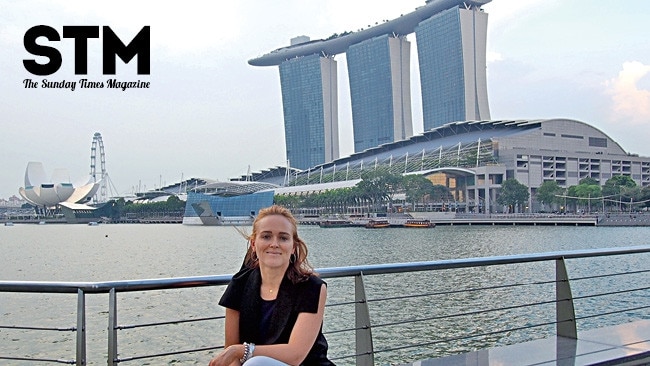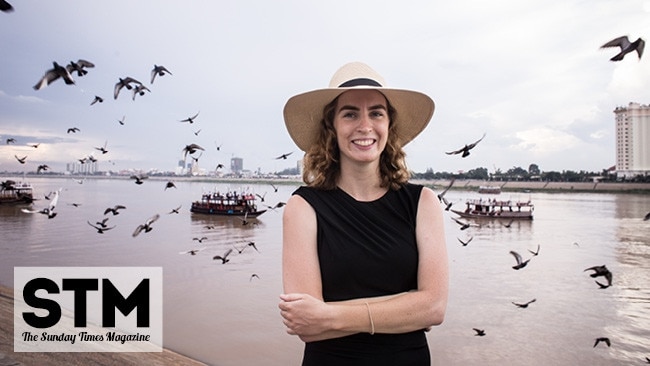Dining with Dayak headhunters
A WINDING river journey aboard a longboat delivers John Swords into the welcoming arms of one of Borneo's last headhunters.

HIS tattoo-covered body shows few signs of his years, which he reckons to be 87. His short legs – also adorned with tribal markings – cross easily on the floor of the longhouse. A wisp of beard drops from beneath a ready smile.
'Doctor' Unding is witchdoctor to the 120 souls in this Iban dayak community in a remote corner of Sarawak, a Malaysian state on the jungle-draped island of Borneo. He is the keeper of myth, magic and medicine.
But behind the clear eyes' sparkling warmth and impish fun, lies a history from the gruesome Dayak past.
For Unding may be one of the last of the headhunters. He tells of killing three times as a young man, presenting the heads of his victims to his longhouse chief.
Two of his victims were Iban 'enemies' from clans other than his own, the third a World War II Japanese soldier. The three skulls, brown from age and smoke, still hang in rattan nets from the longhouse ceiling, still deterring evil spirits.
He was joined by his friend, retired chief Budip – a mere 85, with heavy brass rings hanging in the stretched loops that were his ear lobes. With an interpreter, we had a cross-legged conversation, first over tuak (rice wine) and then with some langkau (more a distilled fire-water).
We spoke of life and sons and changes in longhouse ways since the departure of the Japanese and the incursion of the modern world. Finally, I felt able to ask: "What do you think about the three men you killed?" The reply came instantly, chillingly from gently smiling lips: "I have no sympathies."
Things have changed from the days of Unding's youth. Headhunting was outlawed in the 1930s by Vyner Brooke, the 'white rajah' who ran Sarawak as a private fiefdom.
But in wild times in a wild place, the law was unenforceable, and the murderous practice was pursued with renewed enthusiasm under the Japanese occupation. In 1946, Brooke ceded his little empire to the British, who began treating headhunting as murder. By the 1950s the practice had been relegated to the savage past.
We entered Unding's world from the provincial capital, Kuching, a sprawling modern city of 500,000. We were driven 250km to the banks of the Lemanek River, where members of the Serubah longhouse were waiting.
We loaded on to outboard-powered longboats, winding upstream against a fast current, the flat keel often scraping on river stones as the current bubbled over them. The tangled roots of riverside trees threw up a canopy of cool shade which almost joined from each bank.
Every now and again there was another stationary longboat, its men bending in the shallows, looking for fish with modern goggles. Others tended fishtraps or mended equipment, while women washed food and themselves, or minded splashing, laughing children.
After an hour we were at the longhouse, which stretched on spindly stilts for about 180m, high above the wet season waterline. Deep steps hewn into logs allowed us to climb to a broad, open platform – a work area for the adults and a play area for children.
We entered an immense common room running the length of the longhouse, from which ran neatly numbered doors to the separate apartments of the longhouse's 24 families. Some of the private frontages were adorned with intricate swirls of rattan cane. Bare electric lights hung from the ceiling (although the generators only run from sunset to late evening – after that, the black jungle night takes over).
A yellow pay phone glared from one wall, not far from the hanging skulls. Most of the private doors had their own adornments – on one there were carefully cut-out magazine pictures of a Malaysian soapie star.
Each door had pinned to it the stamp of officialdom – slips from the census authorities noting the number of inhabitants and certificates from the health department recording the dwellers were malaria-free.
On others were religious posters, for these people long ago converted to Christianity, though they don't put all their faith in one basket, judging by the shrines outside with simple offerings to placate evil spirits. Not to mention the skulls.
It was late afternoon, a quiet time for mothers to play with their infants in doorways where an occasional breath from the trees gave relief from the clammy heat. Inside, the old men sat on the floor; outside, the younger ones sat on stacked sheets of dried latex, produce from the rubber trees which provide a cash crop.
Visitors are housed in a second longhouse, dormitory-style mattress and mosquito net – no locks, no lights, and ventilation provided by cracks in the floor and walls. After a dinner made by our guide, we returned to the longhouse.
The community had assembled, with the young adults adorned in traditional costume to dance for us, to music provided by a three-woman gong orchestra. The rest of us sat on the matting floor as the home-brewed tuak flowed again, with excited, wide-eyed children trying to keep up with the fun until they fell asleep where they were.
The formal part of the evening came after the dancing, when we presented the longhouse chief, Budip's son, with our gifts – about $20 worth of sweets and chips for the children. The chief handed them to the women, who carefully divided them into 24 piles, one for each longhouse family.
With some of the young men, who were armed with a guitar and a small repertoire of pop songs, we clambered down the riverbank to a stony spit, where we cooked fresh fish on an open fire and sang deep into the night, our voices echoing from the jungle as occasional fishermen glided past in their silent longboats.
Next morning's activities began early (the pre-dawn chorus of roosters saw to that). Goyan, a farmer, showed us how to use a blowpipe, which can shoot its poison dart up to 25m with accuracy.
We then walked into the jungle, past occasional clearings planted with maize or ready for the wet season rice-planting, past little family burial plots, with offerings on many graves to ensure successful transition to the afterlife. Jungle and farm are inextricably mixed, with wild plants providing food, cloth, rattan and timber for repairing the longhouse or building a new longboat, along with cultivated plants and rubber trees, their wealth oozing from grooves cut in the bark.
Before we left, the men provided entertainment with a series of cockfights – more training fights, with the birds not armed with deadly spikes attached to their claws, as they are in big-betting major contests.
Unding was among them, chuckling with child-like delight as his bird tried to go in for the kill. But the young men were not there. Perhaps for them the Iban past is already a foreign country.
The writer was a guest of Tourism Malaysia and Malaysia Airlines.
The Sunday Telegraph



